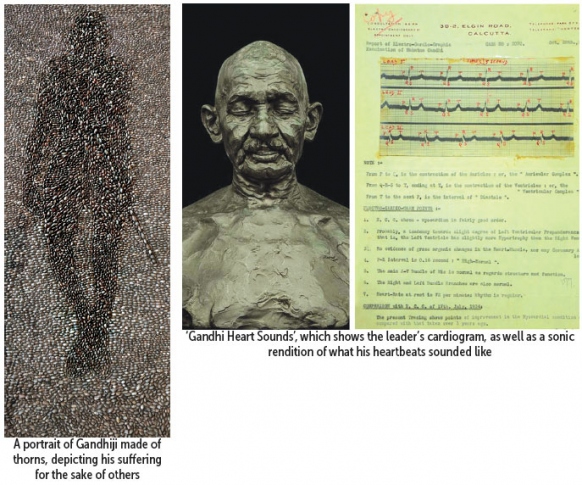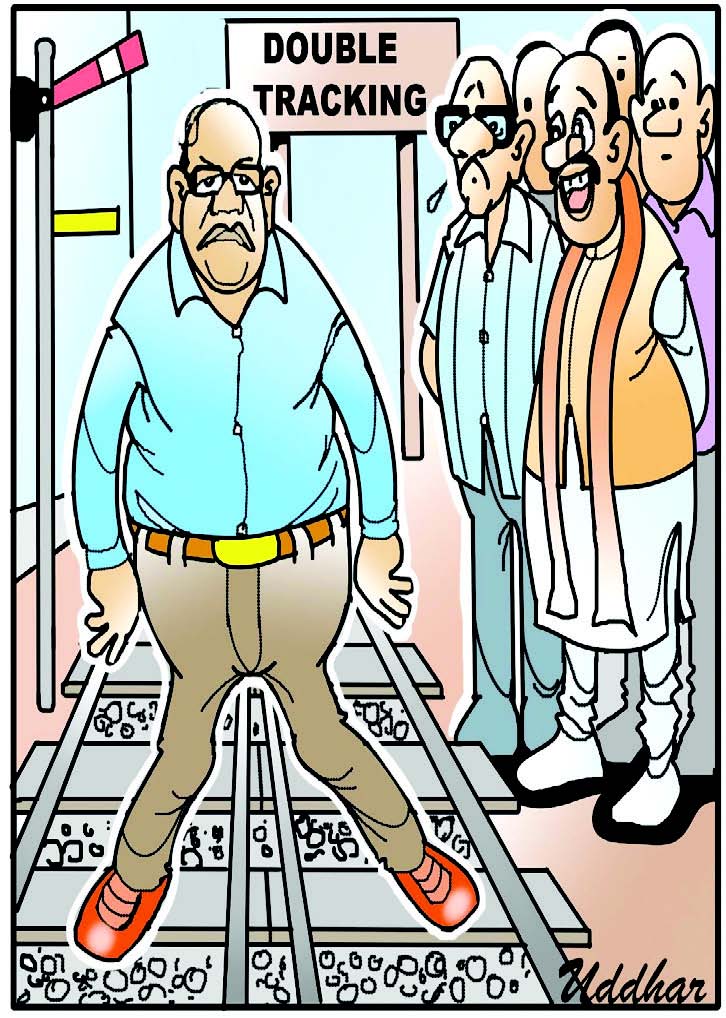
Dolcy D’Cruz
When it comes to finding artworks based on Mahatma Gandhi, one doesn’t need to look further than the Museum of Goa in Pilerne. From listening to how the heart beats of Gandhi sounded, to a sculpture made out of thorns, and various other works by different artists, the Museum of Goa, founded by Dr Subodh Kerkar, would be Gandhi’s home in Goa, a state he never visited in his lifetime, as it was a Portuguese colony. However, these efforts were painstaking and exhaustive for Dr Subodh Kerkar as he travelled to different parts of the world to learn and teach about the Indian freedom fighter. Through his research, he could set up an evolving exhibition, ‘Reclaiming Gandhi’ and now ‘Phir Gandhi’, an exhibition at the Museum of Goa.
Through Dr Subodh’s eyes, we get to see how Gandhi would have looked at cleanliness in Goa. Gandhiji was known for cleanliness, but it had a deeper meaning, which Dr Subodh explains, “Today, Goa is a beautiful state but it has litter everywhere and it has nothing to do with tourists. On the roadsides, one can see piles of garbage and in my opinion, if Gandhi was alive, he would have had an Anti-Litter Satyagraha. He was very creative in choosing the Satyagrahas and movements like the Non-cooperation Movement, Swadeshi Movement, Salt March and Quit India Movement. His non-violent movements have been inspiring generations. He would say that littering is an act of violence against Mother Nature. I have seen people throw plastic bottles and wrappers out of the most expensive cars in Goa. There is no need to prove patriotism by shouting ‘Jai Hind’ and ‘Bharat Mata ki Jai’ but our first step towards patriotism should be by keeping our state and country clean.”
Another form of cleanliness that is the need of the hour is tolerance and non-violence, which Dr Subodh Kerkar calls the cleanliness of the mind. “Gandhiji would want us to clean up the litter in the mind. There is growing hatred against communities which is the litter of hatred and violence shown by fanatics. All this starts by clearing the mind. South African Anglican bishop and theologian, Desmond Tutu, was influenced by Gandhi and says that ‘Gandhi was not against the sinner but the sin’. He was against colonialism, not the British people. We have to start teaching these values from a young age, right from kindergarten children to college students, so that we can see the difference in a few years,” says Dr Subodh.
Another aspect that Dr Subodh feels needs much attention is Gandhi’s equation with religions. After visiting different places and institutes where Gandhi had lived, he has learnt that Gandhi was influenced by all religions especially Buddhism and Jainism. “He was especially influenced by Ahmisa and the Jain doctrine of anekāntavāda, which states that truth and reality is complex and always has multiple aspects. There are many origins to the truth. In 1897, when Mahatma Gandhi was sailing to Africa, there was a storm in the sea and everybody on board started praying to their gods. Gandhi heard these prayers and was influenced by them. These multi-religious prayers are recited in his ashrams starting with the Buddhist prayer in Japanese. He believed that God is trust and trust is God. God is a principle and he believed in this principle. All his life, he strived to set a good relationship between religions, especially between Hindus and Muslims. I feel that he was the greatest human being to walk this Earth,” says Dr Subodh.
As Dr Subodh is always working on themes inspired by Gandhi, he plans to start a new self mission, next. “I am planning to walk around my village, Saligao, every morning for an hour and start collecting the roadside litter that I find. It will take courage and commitment but I hope to set an example and looking at me, maybe more villagers will join in and gradually, we will have a clean state. Maybe even politics will be without litter in the future and we won’t have politicians cheating their voters and jumping from one party to another,” concludes Dr Subodh.
